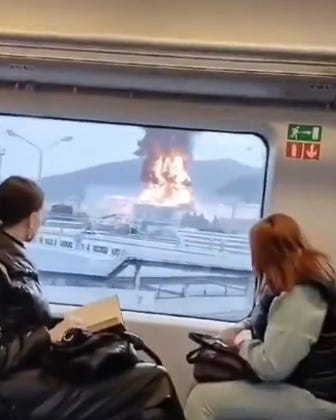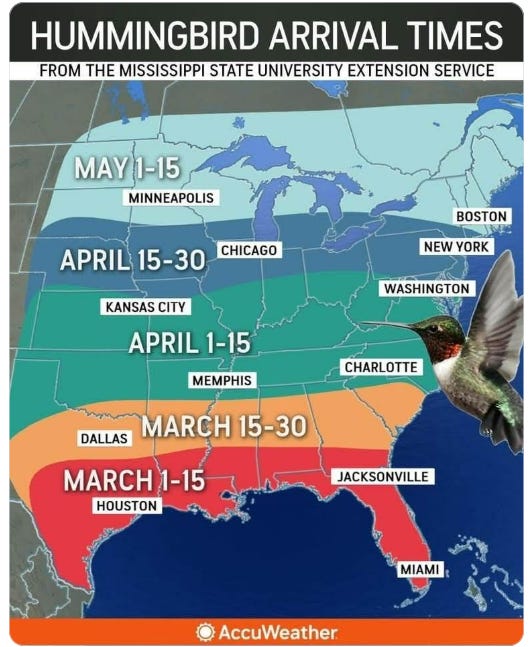
Books, movies, media: Risching Out with the first volume on the Revolutionary War; The Last American, a work I once thought wild fiction, but now has a haunting plausibility – it’s free online, and short, give it a go; House in Gross Disorder, an EVERGREEN recommendation, a fabulous work of legal historiography around one of the most Made for Hollywood stories of English aristocratic drama; #ReadingWomen, a 2017 series to recommend women as author and subject in NatSec returned as a reminder that the Before Times were not idyllic; “Kajaki” (Kilo Two Bravo, US) was the movie of the week, a gripping war film about the tyranny of microterrain and transportation, as well as telling an intensely human and loving story; Anniversary of the first Rickrolling, 1988.
…
What a week for military aid to Ukraine. The Logistics War, which has always pivoted around the mechanics of the logistics, is now buffeted by the winds of politics. Trump’s peace negotiation games, coupled with on-again/off-again material and intelligence support, is having two distinct effects. The first is a sincere concern about what happens if the Americans crash out. To make up the US deficit is roughly 70B Euros, an entirely doable amount. Time will be the important hurdle. The second, as will be discussed next in the section on Alliance Arms, is the more optimistic (if realistically aware of the challenges) turn in Europe to defend Ukraine and rebuild its arms.
In European arms, it is a whole new world out there. Two major developments are the freeing up of economic resources for defense spending *and* a signal move away from US arms. With the Trump Administration rhetoric that exploded at Munich and has only accelerated through cutting off Ukraine and hectoring the NATO allies, questions of American reliability as an ally and arms supplier are not being answered in its favor. Serious doubt over the F-35 – whether service, parts, and upgrades will be maintained – have emerged among buyers and potential buyers. Airbus had a comment on whether US aircraft were a problem in the even Denmark had to defend Greenland. Turkey, in fact, chose the UK Typhoon in lieu of the F-35. The Trump Administration’s halt on support to Ukraine has Europe questioning every service, capability, and good. Musk’s anti-diplomacy with Poland over Starlink was disastrous for the American company’s prospects – Meloni is questioning a contract, and news around a bribery scandal has the deal in the crosshairs – and US compatibility generally. So, while the WSJ wrote that Europeans are skittish about buying American, the French defence budget is “spoiled for choice” and “Germany is back” per Merz on his budget priorities. I continue to remind that European rearmament must prioritize logistics and maritime capabilities after Ukraine arms.
On the front in Ukraine, despite efforts at a reasonable cease fire (which the Russians have now rejected) the Deep Strike campaign opened the week with a coordinated and significant attack across Russia, and continued throughout to take down oil and other logistics targets, among them one of the ten largest refineries in Russia. In Tuapse, train passengers model a real life “It’s fine” meme. Ukraine announced domestic missile production that will expand the campaign’s reach and capacity.
Meanwhile, Russian soldiers left to rely upon donkeys for transport have eaten them. It’s the very image of a losing proposition. War does not feed War. In addition to the woes of the missile and drone campaign against Russian logcap, the industrial malaise deepens, manifesting this week in the rail industry.
In Ukraine, Acme Net Co., a half joke of mine for how to deal with the small drone problem, is in fact up and running to protect roadways critical to supporting the armed forces. Journalists from the PRC make their first trip to the front lines with the Ukrainians. It was far better coverage of the invaded nation than the Russians would have wanted. [LINK] As the UK delivers a significant tranche of weapons to the logistics hub in Poland, Ukrainian industry delivers its own success with news about the drone manufacturing sector, demonstrating the value of the LIFE strategy. And Ukraine and Turkey sign a Free Trade Agreement. Elsewhere, in Ternopil, Strategywoman, one of the top voices of the civilian Ukrainian quotidian experience of the war, the Mollie Panter-Downes of this age, shows the strategy’s other great success, the rail resilience, showing off the station in that small city. This means there is tremendous slack in Ukrainian capacity to shift to military needs if the situation were so dire.
The maritime was on the agenda. While the US said no to a Canadian proposal on the Ghost Fleet, the German Foreign Office responded that the G7 remained committed to security and upholding the rules-based order. Where the US will go with their intransigence on the issue given the collision in the North Sea between an American oil tanker delivery fuel to the armed and a cargo vessel, SOLONG, captained by a Russian. The week ended with intensified confrontation against the Houthis in the Red Sea. Trump and Putin are speaking this week, one possible issue being Black Sea cooperation. Turkey, who has just chosen Typhoons over F-35s, spoken recently about their support for Ukraine’s sovereignty and liberation, and taken sensible domestic political action, is a very curious issue for me.
On trade and tariffs, Anna Jerzewska reminds us all that on top of everything, the administrative logistics of such measures comes as new and increased paperwork requirements. While tariff and their threat everywhere are a problem, the most significant front now is in Canada given Trump’s repeated threats of annexation and deranged commentary over the border line. Despite a party leadership transition and a new PM, the political tide is with ‘elbows up’ confrontation as both Trudeau and Carney spoke forcefully and with great support that Trump’s aggression would be confronted and defeated. They’ve thrown down their gloves and are ready for the fight. The G7 meeting was a moment of narrowly defined concordance despite continued problems over Trump’s rhetoric. Just in terms of the threatened Canadian tariffs, American producers will suffer. While alcohol products are removed from Canadian shelves, manufacturers in the food and beverage industries are worried, and McDonald’s fries are under threat. And to end the week, the Trump Administration went b’egg’ing to Europe to cover the gaps in the US market and help being down prices. Americans are also learning late how many of their goods travel to and fro over the borders, sometimes multiple times. An old joke resonated.
DOGE and the Doorman Fallacy: Government Edition comes in hot with a proposal to shift GSA functions to AI. Meanwhile, yet more problems in US aviation (hey, hey, FAA, who will Musk kill today) manifest. And as DOGE tampers with TSA budgets for bomb-sniffing dogs, knocks out weather forecasting capabilities, measles stalks the country, and ICE terrorizes visitors, the American tourist industry is looking bleak.
The markets are not happy. But the spotlight is on the Tesla meltdown. Vehicle sales and stock prices are spiraling downward together. The Musk brand is Kaput in Germany. In London a brutal street level ad campaign against Musk is ongoing.
X took major hits at the start of the week, which Musk tried to pass off as attacks from Ukraine. Even a Trump Tesla Stump at the White House has had little effect, and CyberTruck is dead car walking as further manufacturing woes manifest – turns out, the glue used to attach the stainless-steel panels do not like the cold. And Senator Mark Kelly, after being called a traitor by Musk, very publicly ditched his Tesla for a Chevrolet.
GITMO Watch is a confused mess as the Administration goes back and forth on the policy, even as they contract out prison space in El Salvador for Venezuelan “criminals”. And to the west of the Cuban base, talk that plans for Panama and “seize the canal by force” are being worked on at the Pentagon was briefly mentioned and then lost to the roar of the news storm.
In the world of Environmental plus ça change, the good people at Northeast Ohio Regional Sewer District reminded us that great advances have been made against degradations of the Industrial Revolution with an excerpt from an old documentary about the Cuyahoga narrated by James Earl Jones. Meanwhile, our snack habits are feasting on fossil fuels for packaging. And closing it all out, I have begun an earnest bit of research on paving and the climate crisis. In both floods and droughts, the movement of stormwater plays a role, and the degree to which global paving practices influences that needs considering. Some of the best work on a driver of mass paving is in free parking. Check out this discussion with the late foremost thinker on the subject, Donald Shoup.







